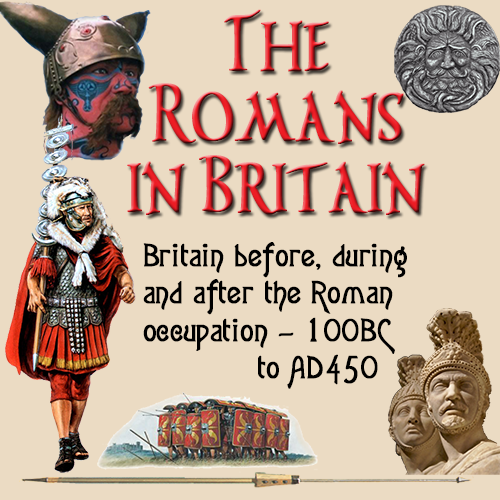The Boudiccan Rebellion -
The Final Battle
The Advance To and Fall of Colchester | London falls
Verulamium is taken | The final battle
Events after the rebellion
The speeches before the final battle
of the Boudiccan rebellion
Tacitus, who set these speeches down, drew upon his father-in-law, Agricola as the main source. However, this was some time after the events occurred, and as no records were kept of the actual final speeches, these are probably approximations (made up guesses) of the true dialogues.
"But now, it is not as a woman descended from noble ancestry, but as one of the people that I am avenging lost freedom, my scourged body, the outraged chastity of my daughters. Roman lust has gone so far that not our very person, nor even age or virginity, are left unpolluted. But heaven is on the side of a righteous vengeance; a legion which dared to fight has perished; the rest are hiding themselves in their camp, or are thinking anxiously of flight. They will not sustain even the din and the shout of so many thousands, much less our charge and our blows. If you weigh well the strength of the armies, and the causes of the war, you will see that in this battle you must conquer or die. This is a woman's resolve; as for men, they may live and be slaves."
Suetonius Paulinus:
'There you see more women than warriors. Un-warlike, unarmed, they will give way the moment they have recognized that sword and that courage of their conquerors, which have so often routed them. Even among many legions, it is a few who really decide the battle, and it will enhance their glory that a small force should earn the renown of an entire army. Only close up the ranks, and having discharged your javelins, then with shields and swords continue the work of bloodshed and destruction, without a thought of plunder. When once the victory has been won, everything will be in your power.'
Preparing for the battle
Looking over the availabale areas for a suitable place that would aid his outnumbered soldiers, Suetonius found one that would put him at an advantage.
Tacitus wrote:
"a position in a defile, with a wood behind him."
This placed him at the top of an incline in keeping with the standard Roman battle tactics, This hill had a forest to one side and meant that he would have to face the enemy from only one direction. His choice was obvious since he is said to only have 10,000 infantry against the 200,000 Britons. The precise location of this battle has never been found or discovered, but it is believed to have been in the West Midlands.
The rebels thought this was going to be another slaughter of Romans, so they assembled as many spectators as possible. Mothers, fathers, grandparents, children, babies, livestock, etc., and wagons loaded with the material gains so far plundered were amasses behind the British. Everyone waited to see the spectacle and revel in their impending victory.
The two forces met on the field and prepared for battle. Boudicca appeared to be "tired and injured," in her clan tartan and armed.
Tacitus:
'in appearance almost terrifying'
The Celts were high on enthusiasm. The sound of drums, pipes and the people shouting carried far and wide. Many Celts were clothed in their tartan attire — many though, were naked, as was Celtic tradition in battle. Brandishing spears, swords, or stolen swords, their skin patterned with blue woad to frighten their enemy. You can imagine the reaction of the highly trained Roman soldiers, outnumbered by far, perched at the top of their slope. They rallied around their commander, who yelled his speech convincing them that the battle could be won. Boudicca gave a final speech, then the Celts charged towards the Romans.
The final battle of Boudicca
 Boudicca's force assembled in a rather loose formation, behind them, their women and
children further back in wagons. The Britons were still using chariots, which is in conflict with the
Roman policy of disarming the natives of any country they conquered. It could be that they were supplied
from tribes not yet under Roman control.
Boudicca's force assembled in a rather loose formation, behind them, their women and
children further back in wagons. The Britons were still using chariots, which is in conflict with the
Roman policy of disarming the natives of any country they conquered. It could be that they were supplied
from tribes not yet under Roman control.
The Romans unleashed their javelins down the slope onto the Britons, followed by the charge of the infantry, all moving as one unit. All this was standard battle tactics for the Romans. This broke up the British force and forced them back to the wagons. Trapped here the battle turned into a massacre. Anyone British: man, woman or child was cut down and killed by the Roman legion.
Most of the advancing Britons were killed in the initial stages, and panic was spreading amongst the British because of the speed of the Roman advance. The Roman cavalry joined the battle and came in from each side, encircling the British. At the rear of the battlefield, the British families sat in their wagons watching the slaughter, knowing they were helpless. As the legionaires contnued the attack Boudicca's forces, they went into the camp where the families had made their vantage point and killed nearly every man, woman and child. Thought there were some survivors, most died. Many individual skirmishes continued well into the evening, until the light faded and darkness brought an end to the carnage.
The final death toll:
- 400 Romans dead
- 80,000 British dead
Tacitus
Some indeed say that there fell little less than eighty thousand of the Britons, with a loss to our soldiers of about four hundred, and only as many wounded.
After the battle
Boudicca was said to have survived the final battle and returned home to Iceni territory, where she poisoned herself. It would have be out of character for Nero to have given her, or her daughters, any mercy. The fate of her daughters is not known. Whether they died with Boudicca or were killed by the Romans, or escaped is unclear. All we do know is that they disappeared from the scene, never to return.
If Boudicca had survived and been captured, Suetonius would have taken her to Rome and displayed her in a triumphal parade in Rome, and subjected to absolute horrors of public torture, before having her executed in the amphitheatre.
Cassius Dio wrote that the British buried Boudicca in an expensive manner appropriate for a Celtic monarch, and hailed her as a hero.
Tacitus says nothing of her burial. There is a story that she was buried at Stonehenge and its legendary circle of stones were set up by the Druids to mark her tomb. However, there is not a solid foundation for this and is the story is largely taken to be a fable — especially since Stonehenge is MUCH older that this time period — as in about 5,019 years older. People like to make fables like this. Simply put, her grave has never been found and there are all kinds of fantasticical and unsubstantiated rumors such as that the queen is buried under platform 8, 9, or 10 at London's King's Cross railway station, yet no traces of her have been found in this or any other location. The closest possible one is the Celtic "Birdlip" Grave... read about it here.
The Advance To and Fall of Colchester | London falls
Verulamium is taken | The final battle
Events after the rebellion




















